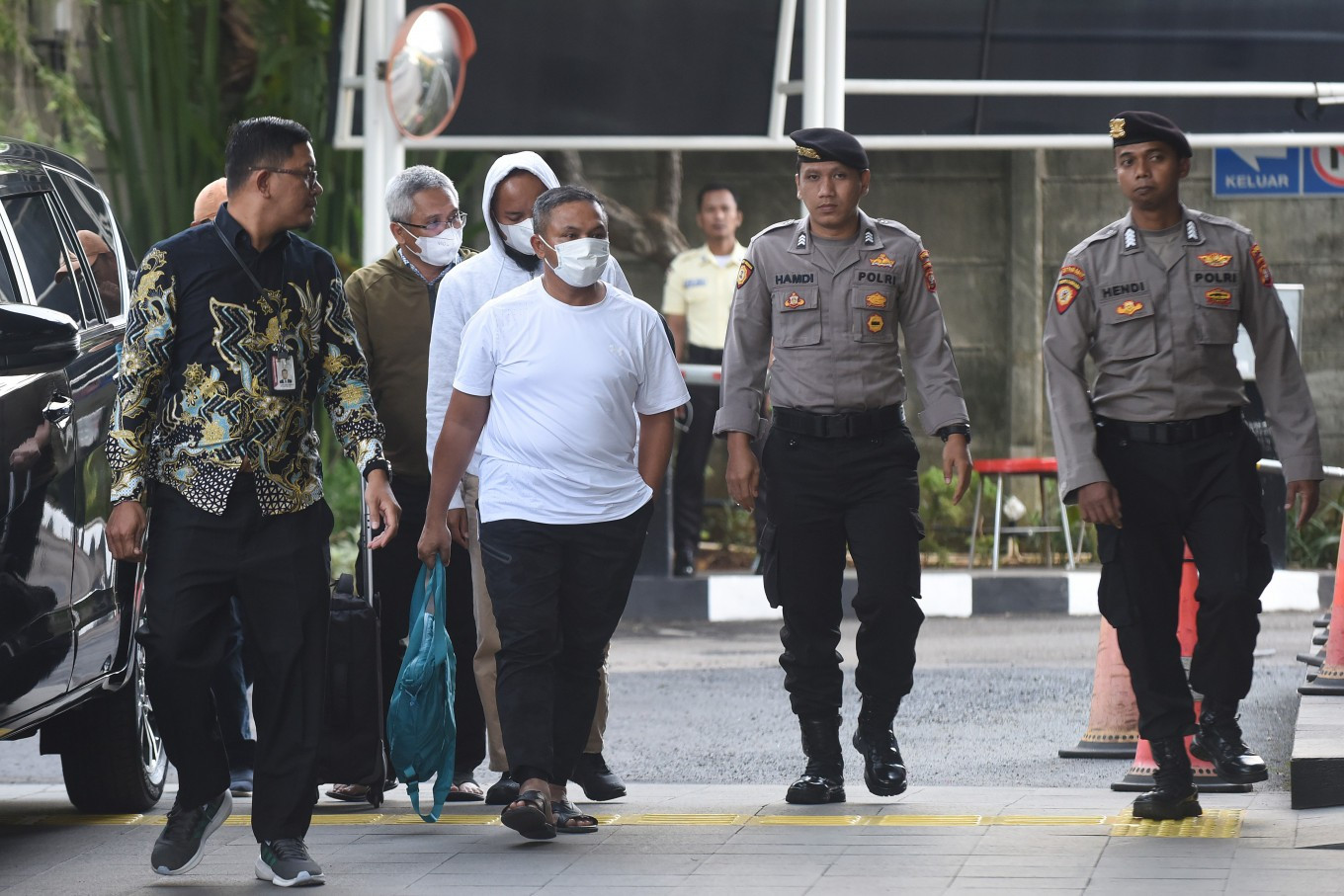News
Riau politicians' penchant for old-fashioned corruption
Tenggara Strategics November 19, 2025 Riau Governor Abdul Wahid is escorted by police officers and Corruption Eradication Commission (KPK) investigators in front of the KPK headquarters in South Jakarta on Nov. 4, 2025. The KPK arrested the governor along with several senior provincial officials a day earlier during a raid in Riau. (Antara/Indrianto Eko Suwarso)
Riau Governor Abdul Wahid is escorted by police officers and Corruption Eradication Commission (KPK) investigators in front of the KPK headquarters in South Jakarta on Nov. 4, 2025. The KPK arrested the governor along with several senior provincial officials a day earlier during a raid in Riau. (Antara/Indrianto Eko Suwarso)
Despite the rise in graft scandals over the past year, a recent sting operation by the Corruption Eradication Committee (KPK) in Riau signals that systemic corruption in the country is showing no sign of slowing down.
On Nov. 3, KPK investigators arrested Riau Governor Abdul Wahid along with his confidant Tata Maulana at a cafe in provincial capital Pekanbaru. The graft probe was initiated in May 2025 after the antigraft body received a tip from local residents alleging potential foul play between Abdul and the province's Public Works and Spatial Planning Agency.
Investigators uncovered an illicit kickback scheme in which the governor, who hails from the National Awakening Party (PKB), demanded 5 percent of the agency's Rp 177 billion (US$11 million) budget allocation, or around Rp 7 billion, threatening the removal or transfer of officials who refused to meet his demand.
Coming after only nine months in office, the probe found that at least Rp 4.05 billion of the Rp 7 billion demanded had been given to Abdul via close aides and confidants, and were reportedly used for lavish trips to countries like the United Kingdom and Brazil.
The KPK also arrested several others, including agency head Muhammad Arief Setiawan and the governor's expert staffer Dani M. Nursalam.
The Riau governor's case represents a familiar rather than an anomalous pattern, and one that feels old-fashioned. While the scandal centers on infrastructure kickbacks, the country's corruption trend has shifted, according to Indonesia Corruption Watch (ICW). The watchdog noted a major change in 2024 when, for the first time, the biggest financial losses no longer came from infrastructure and procurement projects, but from fictitious reporting related to mining permits.
While infrastructure-related cases like Abdul's accounted for 35 percent of all 364 corruption cases recorded last year, non-infrastructure cases dominated with 65 percent. The Riau case fits the general nationwide pattern, however, with the KPK stating that over 51 percent of all graft cases occurred at the regional level, at both local administrations and legislatures. While most graft schemes today involve document fraud related to licensing and reporting, the Riau case presents a throwback to under-the-table thuggery by those in power.
A similar case emerged few days later in Ponorogo, East Java, where the KPK uncovered a corruption network centered on regent Sugiri Sancoko, from the Indonesian Democratic Party of Struggle (PDI-P). Investigators found that a private contractor had paid a 10 percent project fee of around Rp 1.4 billion to Yunus Mahatma, director of the Harjono Ponorogo Regional General Hospital, who then handed a portion of the money to Sugiri via an aide and his brother.
Abdul is the fourth governor of the oil-rich province to be arrested for corruption in the last two decades. Saleh Djasit (1998-2003), Rusli Zainal (2008-2013) and Annas Maamun (2014) were nabbed for a range of graft scandals, from illegal procurements to bribery, with Annas arrested the same year he assumed office, just like Abdul. When it comes to Riau governors, power and greed appear to go hand in hand.
Meanwhile, the incumbent governor has yet to receive a final decision on his party membership from PKB chairman and coordinating social empowerment minister Muhaimin Iskandar, who has warned other members against emulating Abdul.
The contrast between graft styles is stark. Abdul's alleged corruption presents a clearly defined method, unlike the high-profile, politically charged corruption trial early this year of Thomas Lembong, a former trade minister in 2015-2016. Before he was pardoned by President Prabowo Subianto, Thomas was convicted on charges related to incurring Rp 578 billion in state losses for a sugar import scheme he implemented during his tenure as minister.
However, activists and experts noted during his trial that Thomas's actions lacked any mens rea (criminal intent). In comparison, Abdul's actions appeared to have been explicit, according to officials in the Riau public works agency, who described the scheme as nothing more than "a cut for the local thug".
While President Prabowo has pledged to root out endemic corruption, it seems his antigraft efforts have yet to resonate at the regional level.
What we've heard
KPK confiscated Rp 1.6 billion in cash suspected to be linked to the corruption case. The amount consisted of Rp 800 million, US$3,000, and GBP 9,000. The rupiah notes were found in Riau, while the foreign currency was seized from Abdul's private residence.

